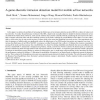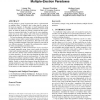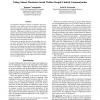13457 search results - page 29 / 2692 » Can we elect if we cannot compare |
ICDCS
2011
IEEE
12 years 7 months ago
2011
IEEE
Abstract—Nowadays companies increasingly aggregate location data from different sources on the Internet to offer locationbased services such as estimating current road traffic c...
COMCOM
2008
13 years 7 months ago
2008
In this paper, we address the problem of increasing the effectiveness of an intrusion detection system (IDS) for a cluster of nodes in ad hoc networks. To reduce the performance o...
SIGECOM
2011
ACM
12 years 10 months ago
2011
ACM
In many settings, a group of agents must come to a joint decision on multiple issues. In practice, this is often done by voting on the issues in sequence. In this paper, we model ...
IPCO
2008
13 years 9 months ago
2008
We discuss an implementation of the lexicographic version of Gomory's fractional cutting plane method and of two heuristics mimicking the latter. In computational testing on a...
AAAI
2010
13 years 9 months ago
2010
In cooperative multiagent systems an alternative that maximizes the social welfare--the sum of utilities--can only be selected if each agent reports its full utility function. Thi...



